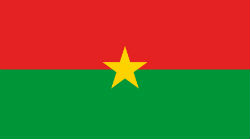In Burkina Faso there is civil law based on the French model and customary law.
Country overview
Population
23.4m
President
Ibrahim Traoré (President of the transition)
Capital city
Ouagadougou
Major industries
Cotton lint, beverages, agricultural processing, soap, cigarettes, textiles, gold
Currency
West African Franc
Languages
French (official), native African languages belonging to Sudanic family spoken by 90% of the population
Major religions
Muslim 63.8%, Catholic 20.1%, Animist 9.0%, Protestant 6.2%, Other 0.2%, None 0.7%
Legal information
- Capital markets
Currency
West African CFA Franc (CFAF)
Exchange
Bourse Régionale des Valeurs Mobilières (BRVM). This is a regional stock exchange serving a number of West African countries including Burkina Faso.
Current number of listed companies
Two as at 4 October 2023 according to BRVM website.
Listing rules
To take part of the market, a security (share or bond) is registered in a compartment of the quotation of the BRVM. The stock exchange has two compartments for shares and a compartment for debenture loans.
Key requirements for the first compartment are that the company candidate should:
- have a legal form of a Société Anonyme (S.A.);
- have a minimum share capital of CFAF 100 millions;
- present its certified accounts for the last 5 years;
- make a commitment to sign a contract of market animation;
- spread in the public at least 20% of its capital corresponding to a minimum of between 2 and 10 millions of shares, from the initial public offering;
- make a commitment to publishing biannual estimations of turnovers and tendencies of results (in essence, non-mandatory requirement to publish balance sheet biannually).
Key requirements for the second compartment, include the following:
- have a legal form of a Société Anonyme (S.A.);
- have a minimum share capital of CFAF 100 millions;
- have up to CFAF 200 millions market capitalisation;
- an undertaking to sign a contract of market animation;
- an undertaking to spread in the public at least 20% of its capital corresponding to a minimum of between 2 and 10 millions of shares.
Key requirements for the third compartment, include the following:
- have a legal form of a Société Anonyme (S.A.);
- have a minimum share capital of CFAF 10 millions;
- 2 years of guaranteed accounts;
- an undertaking to provide a Business Plan covering at least 3 years;
- an undertaking to provide a listing sponsor.
- an undertaking to spread in the public at least 10% of its capital corresponding to a minimum of 500.000 shares.
For debenture loans:
- the minimal number of titles to the emission is of 25.000;
- minimal face value of the emission is of CFAF 500 millions;
- an undertaking to sign a contract of market animation;
- a mandatory requirement on dematerialization of titles.
- an undertaking to provide a financial rating (in the absence of a rating higher than investment grade, a financial guarantee will be required).
Regulatory body or bodies
The Regional Council for Public Saving and Financial Markets has the mission of protecting the Public Saving invested in securities, financial products negotiable on the Stock Exchange or any investment that seeks WEAMU's Public Saving.
It is therefore the only one authorised to:
- regulate and authorise market operations;
- formulate, if necessary, a veto on the introduction of companies in the quotation of the BRVM;
- authorise and control the whole market private companies, notably:
- the BRVM;
- the DC / BR;
- the commercial stakeholders including the brokerage firms - "SCI";
- the Asset Management Companies - "SGP";
- the advisors in Transferable securities;
- the Business developers;
- the Peddlers and Undertaking for Collective Investment in Transferable Securities (UCITS).
- Competition regulation
Community legislation
The Community law on competition came into effect 1 January 2003. It consists of the following:
- Regulation No. 02/2002/CM/UEMOA which deals with anti-competitive practices within the WAEMU;
- Regulation No. 03/2002/CM/UEMOA which deals with procedures applicable to restrictions and the abuse of a dominant position within the WAEMU;
- Regulation No. 04/2002/CM/UEMOA which deals with state assistance inside the WAEMU and the conditions for the application of article 88 (c) of the UEMOA treaty;
- Directive No. 01/2002/CM/UEMOA which deals with issues related to the transparency of financial relations between the member states and public enterprises as well as member states and international or foreign organisations; and
- Directive No. 02/2002/CM/UEMOA which deals with promotion and cooperation between the Commission and the national competition authorities of member states through the application of articles 88 and 90 of the UEMOA treaty.
Legislation
Law No. 016-2017/AN of 27 April 2017
This law governs competition in Burkina Faso. This law defines three types of violations likely to affect the normal administration of competition:
- anti-competitive practices (these include, amongst others, agreements between enterprises and abusive exploitation of a dominant position on the interior market);
- restrictive competition practices (these include, amongst others, imposed prices, below cost-price selling, non-conformity to billing regulations, non-communication of price ranges and conditions of sale, refusing to sell, discriminatory practices among professionals, disorderly sales, para-commercialism, non-compliance with regulations and false advertising);
- fraudulent practices at import and export levels or on guarantee and after-sales service; and
- selling substandard goods thereby disregarding consumer safety considerations.
Impact of regulatory regime on business
Takeovers and mergers are governed by Law No. 016-2017/AN of 27 April 2017.
- Corruption / transparency
Corruption Perception Index score for 2023
42
Corruption Perception Index rank worldwide for 2023
77
Signatories to United Nations Convention Against Corruption (UNAC)?
No
UNAC ratified?
No
Signatories to the OECD Convention on Combating Bribery of Foreign Public Officials in International Business Transactions?
Signatories to the African Union Convention on Preventing and Combating Corruption?
No
Ratified?
No
- Disputes
Judiciary
The Judiciary is independent. The President of Burkina Faso is the guarantor of the independence of the Judiciary; he/she is assisted by the Superior Council of the Magistrate, of which he/she is the President. The Superior Council of the Magistrate makes suggestions regarding the appointment and assignment of judges at the Supreme Court of Appeals, the Council of State and the Court of Accounts, and the presiding judges of the Courts of Appeals. Other Magistrates are appointed and assigned on the proposition of the Minister of Justice. Court sittings are public except as otherwise stated by law. (Article 124 to 136 of the Constitution - in French).
Arbitration
Domestic arbitration is governed by the Uniform Act on Arbitration (the Uniform Act). The Uniform Act governs any arbitration taking place in an OHADA member state, whether the arbitration involves parties from an OHADA country or from a foreign state. Modelled after the UNCITRAL Model Arbitration Law, its purpose is to promote arbitration as an efficient means of dispute settlement.
The CAMC (Centre d'Arbitrage, de Médiation et de Conciliation) in the capital Ouagadougou is the principal arbitration body in Burkina Faso.
Perception of the local courts
In general, the courts are perceived by the local population to be fair and are seen as the best way to administer justice in Burkina Faso. This is particularly true of the higher courts. There does, however, exist a certain amount of bribery and corruption.
There is no legal material documenting such statement. It is deduced from news and practice (website in French).
Enforcement of foreign judgments
Judgments from foreign courts are accepted and enforced by local courts subject to obtaining exequatur.
Structure of the court system
The judicial and administrative jurisdictions are as follows:
- the Supreme Court of Appeal (Cour de cassation) is the highest court in the judicial order;
- the Council of State (Conseil d'Etat) is the highest court on administrative matters;
- the Court of Accounts (la Cour des comptes) is the highest court on issues regarding public finances.
The court system is governed by Law No. 015-2019/AN.
- Enforcement of arbitral awards
Recognition and enforcement of foreign arbitral awards between Burkina Faso and other OHADA member countries is governed by The OHADA Treaty of 17 October 1993. An arbitral award granted pursuant to this treaty is enforceable by virtue of a decision contained in an exequatur issued by the local court.
Burkina Faso is a contracting state to the New York Convention on the Recognition and Enforcement of Foreign Arbitral Awards (New York, 1958) (New York Convention). Awards granted by New York Convention member states are enforceable pursuant to this convention.
- Foreign investments
Foreign investment incentives
The Law No.038-2018/AN of 30 October 2018 governs investment.
The investment code demonstrates the government's interest in attracting Foreign Direct Investment to create industries that produce export goods and provide training and jobs for its domestic workforce. The code provides standardised guarantees to all legally established firms, whether foreign or domestic, operating in Burkina Faso. It contains four investment and operations preference schemes which are equally applicable to all greenfield investments, mergers, and acquisitions.
Burkina Faso's investment code guarantees foreign investors the right to the overseas transfer of any funds associated with an investment, including dividends, receipts from liquidation, assets, and salaries. Such transfers are authorised in the original currency of the investment.
Foreign investor rules
Listing Companies: N/A
- Regulation
Industry-Specific Legislation
Click to download laws relating to:
Mining - National Mining Commission
Mining - Provision reconstitution gisements
Mining- Gestion des autorisations et titres miniers
General legislation
Law No. 2001 of 25 October 2001 relating to the Advertising Code
- Taxation
Exchange control
Capital transactions between WAEMU (West African Economic and Monetary Union) countries are not restricted.
Outward capital transfers require the authorisation of the Ministry of Finance, except in the case of (i) amortisation of debts and repayment of short term loans granted to finance industrial and commercial operations; and (ii) payments for the purchase of options.
Capital receipts from non-WAEMU countries are generally permitted.
Payroll tax and social security
Payroll tax in Burkina Faso is very similar to income tax but the employer deducts and pays it according to earnings. Social security fees, public health insurance and other deductions are all included in this payment and other deductions in Burkina Faso are dependent on income.
Social Security Contributions: 16%
Payroll and Apprentice Tax: 3%
Value Added Tax
18% standard rate
Burkina Faso has temporarily suspended VAT on foodstuffs. Simplifying and consolidating the tax code is a major item on the government's reform agenda.
Transer pricing
There are no specific transfer pricing rules but general anti-avoidance rules require group transactions to be made at arm’s length prices.
Technical service fees
- 5% Paid by a resident mining company to a resident company.
- 15% Paid by a resident mining company to a non-resident company.
Interest
6 % - On interest paid to both resident and non-resident companies for bonds and debentures and 25% for debt instruments.
Real property tax
Income from real estate not exceeding CFAF 100,000 is taxed at 18%, otherwise a tax rate of 25% applies.
Royalties
5% paid on royalties to resident and 20% to non-resident companies.
Personal income tax
0% - 25% on salaries
Stamp duty
XOF 200 per page
Losses
N/A
Capital gains tax
10% of ordinary business income (gains from real estate are taxed separately at 10%).
Corporation tax
Corporation Tax Rate: 27.5%
Corporate tax or company tax in Burkina Faso is the amount taken from the earnings of corporations.
The Burkina Faso government has announced that it has reduced its corporate tax rate for mining companies from 25% to 20% since it has a 10% non-participating interest and a 3% net smelter royalty in the Essakane Project.
Export processing zone
There are no export processing zones in Burkina Faso.
Dividends
0.125
Thin cap regulations
There are no specific thin capitalisation rules but there are limitations on minimum equity-to-loss ratios.
